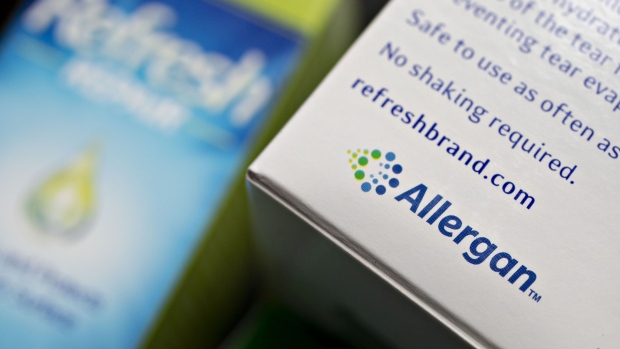Jul 7, 2020
Evolus Botox Rival Loses First Round Over AbbVie’s Allergan
, Bloomberg News

(Bloomberg) -- AbbVie Inc.’s Allergan and its Korean partner Medytox Inc. won the first round of a U.S. trade dispute in which they are trying to block imports of Evolus Inc.’s Jeuveau, a rival to the Botox wrinkle treatment.
A U.S. trade judge investigating claims that Jeuveau was developed using stolen trade secrets found against Evolus and its partner, Daewoong Pharmaceutical Co., and has recommended a 10-year ban on Jeuveau imports, the companies said in statements.
U.S. International Trade Commission Judge David Shaw’s findings -- not yet public to allow both sides to redact confidential information -- aren’t final. They are subject to review by the commission, which has the power to block imports of products that violate U.S. intellectual property rights and is scheduled to complete the investigation in November.
Daewoong called the judge’s findings and recommendation a “misjudgment,” while Evolus said the companies “strongly disagree” with the judge. Both pledged to urge the commission to reject the decision.
Medytox rose to the daily limit of 30% in Seoul Tuesday, while Daewoong fell as much as 21%. Evolus plunged as much as 34% in post-market U.S. trading.
Officials from AbbVie didn’t immediately return email and voice mail queries seeking comment.
Allergan and Medytox contend a former Medytox employee handed over to Daewoong the results of its “meticulous, time-consuming, and expensive research” into a new process to make a treatment based on the deadly botulinum toxin, according to the complaint.
The process to turn the toxin into Botox, which also is used to treat chronic migraines and urinary incontinence, has been a closely kept secret by Allergan, allowing it to maintain its dominance since it was first approved for sale in 1989.
The trade secret at dispute in this case is for a next-generation drug developed with Medytox for a liquid-type version that’s seen as easier to use than Botox, which must be mixed with saline for injection.
Medytox’s first botulinum toxin treatment, Meditoxin, began selling in Korea in 2006 and the company has worked since then to develop its newer product, Innotox, in 2014. It plans to sell a derivative of Innotox in the U.S., known as MT10109L, with Allergan.
Daewoong markets its product in its native South Korea under the name Nabota and sells it elsewhere as Jeuveau. Evolus, run by former Allergan employees, has an exclusive license to sell it in the U.S.
A key issue will be whether the U.S. trade agency has the authority to get involved in this long-running dispute since the trade secrets have never been used in the U.S., Evolus said. The ITC’s job is to protect U.S. markets from unfair trade practices.
The case “represents an improper attempt to use the USITC as a means to litigate a dispute between two Korean competitors that is completely disconnected from the United States,” Evolus said in its statement.
Daewoong can ask for a review of the judge’s findings, but in many cases the commission decision was the same as the judge’s findings, according to a note by Min-Jung Sun, analyst at Hana Financial Investment in Seoul.
Any import ban could be overturned by the Trump administration on public policy grounds, though that rarely happens. The losing side is likely to next challenge the decision with an appeals court in Washington that handles all appeals from the trade agency.
Evolus, which got regulatory approval to sell Jeuveau in the U.S. in the same week Allergan filed the ITC complaint, reported $34.2 million in sales of the treatment last year, though sales this year have been hurt by the coronavirus pandemic.
Evolus has been “somewhat uniquely pressured” by the pandemic and the ITC case has added an overhang that could cause “significant volatility” on the company’s stock, Mizuho analyst Vamil Divan said in a note to clients. Divan expects Daewoong and Evolus to either ultimately prevail or agree to a settlement to avoid any import ban.
AbbVie bought Allergan earlier this year for $63 billion to diversify its revenue beyond the Humira arthritis drug, the world’s best-selling medicine, and give it time to build a pipeline to future blockbusters.
The ITC case has been thrown off by criminal investigations in Korea that accuse Medytox and its chief executive of falsifying records and using unapproved drug substances.
Evolus and Daewoong argued in filings with the agency that the criminal case undermines the entire ITC dispute. It said there’s a possibility that Medytox’s products will be permanently pulled from the market in Korea and that MT10109L won’t be approved in the U.S.
“Medytox’s falsification of data submitted to regulators shows to be false Medytox’s claim that its Meditoxin manufacturing processes are valuable ‘crown jewels,’” Daewoong and Evolus said in a filing with the agency.
Medytox, which denies the criminal allegations, told the agency there is an “utter lack of relevance” to the ITC case and accused Daewoong of an “ongoing campaign to smear Medytox in hopes of obscuring or confusing the compelling evidence of their unfair acts.”
The case is In the Matter of Certain Botulinum Toxin Products, Complaint No. 337-3359, U.S. International Trade Commission (Washington).
(Adds Evolus statement in paragraphs 4, 12, and 13.)
©2020 Bloomberg L.P.